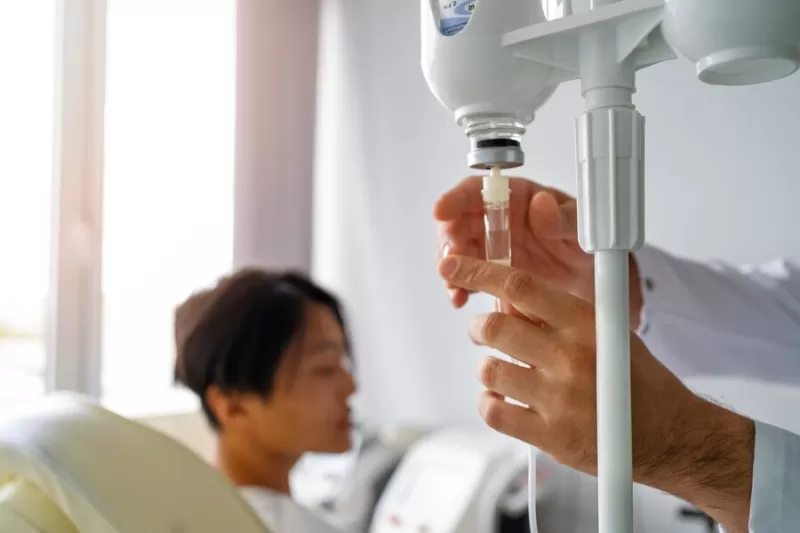Imagine you’re feeling extremely dehydrated after a long hike. You drink water, but it seems like it’s not enough. Now, imagine receiving fluids directly into your bloodstream, instantly revitalizing your body. This is the essence of IV fluid drip. This therapy is a medical technique that involves administering fluids, medications, or nutrients directly into a patient’s vein, ensuring rapid absorption and immediate relief. Now we will explore the benefits of intravenous fluid therapy, compare it, with IV fluids vs drinking water recovery, and delve into the IV fluids nursing considerations must be considered when administering this therapy.
What is Intravenous Fluid Therapy?
Intravenous fluid therapy is a medical process where fluids are delivered directly into the vein through an IV fluid drip. This method allows for quick hydration, medication delivery, and nutrient absorption, bypassing the digestive system. It is commonly used in hospitals, clinics, and even for home treatments under professional supervision.
How Does IV Fluid Drip Work?
An IV fluid drip involves inserting a small, flexible tube called a cannula into a vein, typically in the arm. The tube is connected to a bag of sterile fluids, which flows into the bloodstream at a controlled rate. This method ensures that the body receives the necessary fluids and nutrients directly, providing rapid relief and support.
Benefits of Intravenous Fluid Therapy
Rapid Rehydration
One of the primary benefits of IV therapy is its ability to provide rapid rehydration. When the body is dehydrated, drinking water may not be sufficient, especially in severe cases. This is why IV fluid drip is better in IV fluids vs drinking water recovery, as it bypasses the digestive system, ensuring that the body absorbs immediately.
Efficient Delivery of Nutrients and Medications
Intravenous fluid therapy is also used for administering nutrients and medications efficiently. For patients who cannot take oral medications or have digestive issues, IV therapy ensures that they receive the necessary treatments without delay. This is where serum therapy can be particularly beneficial.
Customizable Treatments
IV therapy allows for customizable treatments tailored to individual needs. Whether it’s rehydration, vitamin supplementation, or medication delivery, the therapy can be adjusted to meet specific health requirements. Serum therapy is often used to provide essential vitamins and minerals directly into the bloodstream.
IV Fluids vs Drinking Water

Speed of Absorption
When comparing IV fluids vs drinking water, one of the most significant differences is the speed of absorption. Drinking water must pass through the digestive system before it is absorbed into the bloodstream. This process can be slow, especially if the body is severely dehydrated. In contrast, IV fluid drip enters the bloodstream directly, providing immediate hydration.
Effectiveness in Severe Dehydration
In cases of severe dehydration, such as after intense physical activity or illness, drinking water might not be effective enough. IV fluid therapy can quickly restore the body’s fluid balance, making it a preferred choice in emergency situations. The comparison of IV fluids vs drinking water highlights the efficiency of IV therapy in critical conditions.
Enhanced Nutrient Delivery
While drinking water is essential for hydration, it does not provide the nutrients that IV fluids can offer. Serum therapy, a type of intravenous fluid therapy, includes essential vitamins and minerals that support overall health and recovery. The benefits of serum therapy go beyond simple hydration.
IV Fluids Nursing Considerations

Monitoring and Adjustments
Nurses play a crucial role in administering IV fluids. They must carefully monitor the patient’s condition, ensuring that the fluid drip rate is appropriate and adjusting it as necessary. This attention to detail helps prevent complications and ensures effective treatment. Understanding the specifics of IV fluids nursing considerations is essential for optimal patient outcomes.
Preventing Infections
Another critical consideration is preventing infections. The insertion site for the IV must be kept clean and sterile to avoid introducing bacteria into the bloodstream. Nurses are trained to follow strict protocols to maintain sterility and protect the patient. These IV fluids nursing considerations are vital for patient safety.
Patient Comfort and Communication
Ensuring patient comfort is also a key aspect of nursing care during IV therapy. Nurses must communicate effectively with patients, explaining the procedure and addressing any concerns. This helps alleviate anxiety and ensures a smoother treatment experience. Proper communication is a significant part of IV fluids nursing considerations.
Practical Applications of IV Therapy
Medical Emergencies
IV therapy is indispensable in medical emergencies, such as severe dehydration, shock, or blood loss. It provides rapid and controlled rehydration and medication delivery, which can be life-saving. In such scenarios, serum therapy can be used to quickly deliver essential nutrients.
Chronic Illness Management
For patients with chronic illnesses, such as Crohn’s disease or cancer, IV therapy offers a reliable way to receive necessary nutrients and medications, improving their quality of life. Serum therapy can also support these patients by providing vitamins and minerals directly into the bloodstream.
Athletic Recovery
Athletes often use IV therapy for recovery after intense training or competition. The quick rehydration and nutrient delivery help them recover faster and maintain peak performance. Serum therapy is frequently used to boost recovery by providing essential nutrients.
Intravenous Fluid Therapy in Costa Rica

Costa Rica has become a hub for advanced medical treatments, including IV therapy. Clinics like Express Medical Costa Rica offer top-notch IV therapy services, ensuring that patients receive high-quality care in a comfortable environment.
Why Choose IV Therapy in Costa Rica?
Costa Rica is known for its excellent healthcare system and highly trained medical professionals. Patients can expect personalized treatments, modern facilities, and a focus on patient comfort and safety. Whether you are a local resident or a medical tourist, you can benefit from the expertise and care provided by Costa Rican healthcare providers. Serum therapy is also widely available, making Costa Rica an excellent choice for comprehensive medical care.
Unlocking the Benefits of Intravenous Fluid Therapy

This therapy is a powerful tool in modern medicine, offering rapid rehydration, efficient nutrient delivery, and customizable treatments. Compared IV fluids vs drinking water, the intravenous fluid provides faster and more effective relief, especially in severe cases of dehydration. Nurses play a vital role in ensuring the safe and effective administration of IV therapy, making it a trusted method in medical emergencies and chronic illness management. Key IV fluids nursing considerations include monitoring the patient, preventing infections, and ensuring patient comfort. The benefits of serum therapy further enhance the value of IV fluid therapy.
If you are interested in learning more about intravenous fluid therapy or need medical assistance, contact Express Medical Costa Rica today. Their experienced medical professionals are ready to provide you with the highest quality care and support for all your healthcare needs, including IV fluids and other essential treatments. Don’t wait—reach out now to ensure your health and well-being. For more information, visit our blog where you will find other articles




